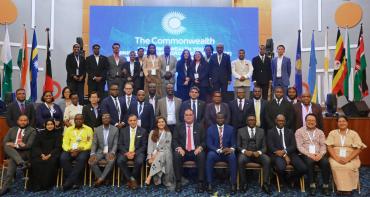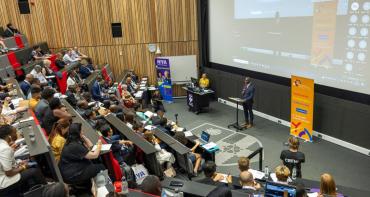From Fiango Kumba in the South West region of Cameroon to Mumius Kakamega county in Western Kenya, two different but interwoven stories emerge of young people committed to ensuring peace in their communities and beyond.

This blog is part of the Commonwealth’s ‘16 Days of Actions’ series, designed to showcase multi-disciplinary national solutions in addressing violence against women and girls. These proven solutions build on the collective experience of the 54 member countries – representing one-third of humanity – which can be replicated elsewhere to create a safer world for every woman and girl. Read the full series here.
From Fiango Kumba in the South West region of Cameroon to Mumius Kakamega county in Western Kenya, two different but interwoven stories emerge of young people committed to ensuring peace in their communities, and beyond.
Achaleke Christian, a victim of radicalisation and violence himself, changed his trajectory. Instead of becoming yet another young person involved in the endemic violence in his Cameroonian town, he rejected the status quo of kidnapping, jungle justice and brutal attacks. Achaleke instead became an ambassador of peace and change - not only in his community and country, but also across the Commonwealth. His passion is tireless advocacy against the ongoing conflict that has been hindering education and youth development.
Adversity into opportunity
In 2016, Achaleke received the Commonwealth Youth Award for Excellence in Development Work. He later joined the Commonwealth Youth Peace Ambassadors’ Network (CYPAN) where he eventually rose to the position of Pan-Commonwealth Coordinator. Through his work, he continues to champion youth-led action for peace and preventing violent extremism. With more than 200 youth development and peace-building projects, he is helping to empower millions of young people.
At the same time, another young peace-builder, Kenyan Christine Odera, has been developing innovative ways to promote the healing and socio-economic transition needed to overcome the challenges of exclusion and inequality in her country. Christine, who is the Kenya National Coordinator for CYPAN, will take up the mantle of Pan-Commonwealth Coordinator this month.
Interestingly, her work is focussed, not just on boosting youth-led action and strategies to improve security and prevent violent extremism, but also on addressing the related issue of domestic violence. Her ‘Waiting to Exhale’ initiative recognises that, at times, it is difficult for young people – even those most vocal about gender-based violence - to share their personal experiences and challenges at home.
The programme gives youth leaders the confidence to speak about domestic violence, intimate partner violence or other socio-economic problems within their households, without fear of judgment.
Describing the project as a source of encouragement and support, Christine said: “Youth leaders are the ones people run to when they have problems, but they usually have no one to run to for protection or to talk to about what they are going through.
“‘Waiting to Exhale’ is a support group, which provides a safe space to encourage and build each other up and create a sisterhood and brotherhood. Its purpose is also to educate youth leaders on the importance of creating meaningful support systems outside work or the spaces they have influence.”
Agents of change
Achaleke and Christine are glowing examples of the critical role that youth play in achieving sustainable socio-economic development and promoting peace and safety in their homes, their communities and their countries. However, they are not the only ones. Within the CYPAN alone, there are 345 young people across 54 countries that have taken up the responsibility of improving peace and security – and they are inspiring other young people to do the same.
The Commonwealth Secretariat created CYPAN to address the reluctance to recognise and strengthen the youth’s contributions to peace and security. The network engages young peace builders, connecting them and amplifying their work.
This support of youth-led action has been, and continues to be, a defining feature of the Commonwealth’s approach to development and peace.
Moving forward
Today, on the fifth anniversary of the adoption of the UN Security Council Resolution 2250, it is important for us to reflect on what we must to do scale up our support to Achaleke, Christine and all our other young peace ambassadors.
The resolution recognises that critical importance of young people’s active participation and engagement in security initiatives. It urges countries to put the youth at the centre of five security pillars: participation, protection, prevention, partnership, disengagement and reintegration.
Commonwealth Secretariat has been instrumental in its implementation, conducting research to support its development, and, through Commonwealth leaders’ mandates, encouraging member countries to back youth-led mechanisms.
Today, we salute all our invaluable young peace builders and activists for their passion and commitment, and for sparking the flames of change. They personify the values of the Commonwealth, and demonstrate the power of youth to combat all forms of violence, including violence against women and girls.
The ‘16 Days of Actions’ blog series is part of the Commonwealth Says NO MORE campaign. Read the full series here, learn more about the Commonwealth’s work on ending violence against women and girls here – and join in the conversation on social media by using #CommonwealthSaysNOMORE.



